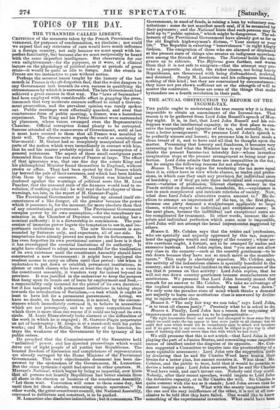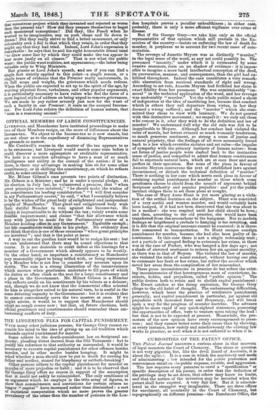THE ACTUAL OBSTRUCTION TO REFORM OF THE I N COME-TAX.
Tnn public ought to understand the true reason why it is found impossible to obtain an amendment of the Income-tax. That reason is to be gathered from Lord John Russell's speech of Mon- day night. It is, in fact, that Lord John Russell and his col- leagues want the intellectual capacity, in the first place to con. ceive the inequality and injustice of the tax, and secondly, to in- vent a better arrangement. We presume ford John's speech tc be perfectly sincere and honest; we presume him to have made a clean breast of it, and to have said all.that he thought upon the matter. Presuming that honesty and frankness, it becomes very interesting to find what the Minister has to say for himself, who thinks the present Income-tax tolerably fair—whose inventive imagination stops at the present arrangement as being near per- fection. Lord John admits that there are inequalities in the tax; but be assigns the following reasons for not altering it. Reason 1. Those who argue for rendering the tax more equal than it is, either have in view whole classes, as trades and profes- sions, in which case they omit any provision for individual cases of hardship ; or if they go into those individual and exceptional cases—varieties of profession, Tiferent charges, money in the Funds settled on distant relatives, leaseholds, &c.—experience is lost in such complicated and intricate relations of society. Now, what does Lord John's alternative reason amount to ? He de- clines to attempt an improvement of the tax, in the first place, because one party demand a readjustment applicable to large classes, without regard to individual and exceptional cases; in the next place, because the indiiidual and exceptional cases are too complicated for treatment. In other words, because the ab- solute and individual perfection which some miss is impossible, Lord john will not attempt the broad improvement suggested by others.
Reason 2. Mr. Cobden says that the trades and professions, who are specially and unjustly oppressed by this tax, compre- hend the aggregate wealth and energy of the country ; whose ac- tive exertions ought, it fortiori, not to be cramped by undue and excessive burdens. Lord John replies, that "you must not allow any class in the country—such as the country gentlemen—to be run down because they have not so much merit as the manufac- turers." This reply is absolutely senseless. Mr. Cobden says, the activity of the industrious classes is specially beneficial to the country, and it is a very bad incident in the unequal pressure of the tax that it presses on that activity : Lord John replies, that he will not run down country gentlemen because manufacturers are meritorious. We presume that Lord John honestly meant that remark for an answer to Mr. Cobden. We take no advantage of the implied assumption that somebody must be "run down." We only note the peculiar state of mind which thinks a demand not unjustly to harm one meritorious class is answered by declin- ing to injure another class.
.Reason 3. "The only fair way we can take," says Lord John, "is to treat all classes justly." Precisely what be is asked to do. Reason 4. Finally, Lord John has a reason for supposing all improvement on the present tax to be impracticable-
" My right honourable friend and myself had attempted to draw some line by which we could make the tax appear to bear more justly on all classes: but we could find none which would not be immediately open to attack and invasion; and if we gave way in any one case, we should be obliged to give way in other cases of hardship still more severe than that with which we had dealt."
We still presume that this is not a trick—that Lord John is not playing the part of a Junius Brutus, and concealing some impolitic excess of intellect under the disguise of its opposite. Mr. Cob- den suggested a Committee to inquire into the practicability of a more equitable assessment : Lord John sets the suggestion aside by declaring that he and Sir Charles Wood have beaten their brains for a better plan, but cannot contrive it. What then? Mr. Cobden, and the public to boot, hold that it would be possible to devise a better plan : Lord John answers, that he and Sir Charles Wood have tried, and can't invent one. Nobody said they could. Nobody, after their recent speeches, would impute to Lord John the inventive capacity, or to Sir Charles the will. Sir Charles is quite content with the tax as it stands ; Lord John avows that he cannot imagine a better. What with the scanty imagination of the one and the easy indifference of the other, it is not at all con- clusive to be told that they have failed. One would like to know something of the experimental invention. What could have been that monstrous project which they invented and rejected as worse than the present tax ? How did they prepare themselves to beget such monstroud conceptions? Did they, like Fuseli when he wanted to be imaginative, sup on pork chops and lie down to dream? Did they really strive to find a better assessment, or only colourably seek a foil to that which they retain, in order that they might say that they had tried. Indeed, Lord John's expression is remarkable: he says that he and his right honourable friend tried "to draw some line by which they could make the tax appear to bear more justly on all classes." That is not what the public want : the public want realities, not appearances,—the latter being valuable only to Whig Ministers. But glance at Lord John's speech, and see if you can find a single fact strictly applied to this point—a single reason, or a single trace of evidence that the Premier really understands, in its full scope and weight, the grievance which needs redress. When the public are expected to act up to the spirit of the age, by waiving physical force, turbulence, and other popular arguments, it is particularly necessary to have rulers who feel the force of a more logical style of address on being urged to remove grievances. We are made to pay rather severely just now for the want of such a faculty in our Premier: it costs us the unequal Income- tax. For Lord John refutes the definition of human nature, that "man is a reasoning animal."



























 Previous page
Previous page